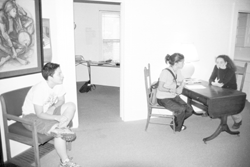|
WRC
Zoning Issue Resolved
by Shahana
Siddiqui
 |
|
Safe
Space, Resource Center: The WRC hosts a number
of campus resources, including ExCos on women's issues.
(photo by Lee Dolan)
|
|
On
Wednesday, after discussion between the College, the city and students,
a decision made by the college to close the Women’s Resource
Center (WRC) because of city zoning violations was overturned.
Last weekend the College had informed students involved with the
WRC that the 124 Woodland Street location would need to close immediately
due to the city’s charge that the mixed institutional use of
the WRC violated area residential zoning regulations. But as more
questions were asked about the nature of the grievance letter that
had been forwarded to the College by the city and the exact zoning
regulation code that the letter discussed, the College established
that the WRC is, in fact, in compliance with area zoning regulations.
As of now, the WRC will remain at 124 Woodland.
The decision to close the WRC was made quickly, and many felt that
from the get-go the problem required more careful attention. “I’d
like to think that if the letter hadn’t gone out to students
so prematurely, the College would have checked into [the zoning
violations] and found it groundless,” Dean of Students Peter
Goldsmith said. Acting Director and Advisor to the WRC Rachel Beverly
was on a short vacation when the decision to close the center was
announced.
About 10 days prior to the announcement that the WRC was violating
zoning regulation a letter from the town had been forwarded to Dean
of Students Peter Goldsmith, first suggesting that the use of the
house as a College office was out of compliance with the residential
zoning regulations of the City of Oberlin. Upon receiving the notice,
the College began discussing short-term and long-term solutions
to closing the 124 Woodland facilities. At that point, the exact
code or clause that the center was violating remained unknown
The original grievance letter that had been forwarded to the Dean
of Student was not shared with anyone and was labeled as confidential.
According to City Manager Robert DiSpirito though, any letter sent
from the city stands as public record. DiSpirito also confirmed
that under Chapter 1337.02 “Permitted Uses” of the “R-2”
Dwelling District, residential houses, like the 124 Woodland Street,
are allowed to hold different businesses and thus by the description
of the Women’s Resource Center, no regulations were violated.
“The letter came from the town to the town government calling
the town’s attention to what the letter writer regarded as
a possible violation of code on part of the College. It appears
that this person was mistaken and the use of the building is appropriate,”
Goldsmith said after speaking with DiSpirito and rescinding the
decision to close the building.
The Service Building and the Finance Department of the College declined
to comment on the matter.
Five years ago, students, working with the help of Associate Dean
of Students William Stackman, had established The Women’s Resource
Center. First situated in the Biggs wing of Stevenson, the center
moved to the 124 Woodland house when the residents moved out. Since
then the house has operated as a safe space for Oberlin women, a
resource center, complete with books for loaning out, and functioned
as a part of the administration office, mainly under the Office
of the Dean of Students. The original proposal for the establishment
of the WRC requested funds, staff position(s) and a permanent space.
So far, some funds from the President’s office have been allocated;
the 124 Woodland space was given, but no staff members to coordinate
programming, activities and other official business and transactions
have been offered. Instead, students work on a voluntary basis at
the WRC, taking care of the facilities, holding office hours and
planning activities throughout the year to educate the broader college
community on gender and sexuality issues through speakers and ExCo
classes. Rachel Beverly, Associate Dean of Students and the Director
of the Multicultural Center was asked to handle WRC matters when
she joined Oberlin’s staff last year.
Since Beverly’s addition the WRC has conferred with other administration
offices on the possibility of renovating the house in order to utilize
the space more fully and also to make the building handicap accessible.
Students look to fix problems such as the building’s lack of
fire escapes, which makes the second floor unusable.
Last year, while working towards this possible renovation, WRC members
were made aware for the first time about the zoning conflicts surrounding
the house. “Whether that was an issue the college intended
to resolve or not, remained unclear to us all,” senior and
long-standing member of the WRC board Ananda Timpane said. She also
mentioned that while the WRC board members were aware of the zoning
issue, nobody knew exactly why it was an issue. According to Timpane,
when the question of the building’s formal zoning license rose,
records were, for the most part, inaccessible.
However, minutes from meetings conducted by the College did give
an impression that the space was committed to WRC on a permanent
basis. Timpane expressed concerns on the need for a more structured
approach to staff and student interactions regarding the WRC and
the need for steady record keeping.
“I feel that the [administration] have chosen not to share
any information on the mission statement or the continuing process
of the WRC,” senior and the oldest WRC member Tiffany Foo said.
In order for proper documentation to be kept, students and administration
decided that a proper staff is needed for the WRC.
“This
space is very valuable to me, it is an important space for everyone…
I am paying here to be a student here, to use the resources here,
to learn, it is not my job to ask the people whose salaries I am
paying and will be paying in student loans for the rest of my life
why they are not doing their job,” Timpane said.
|




